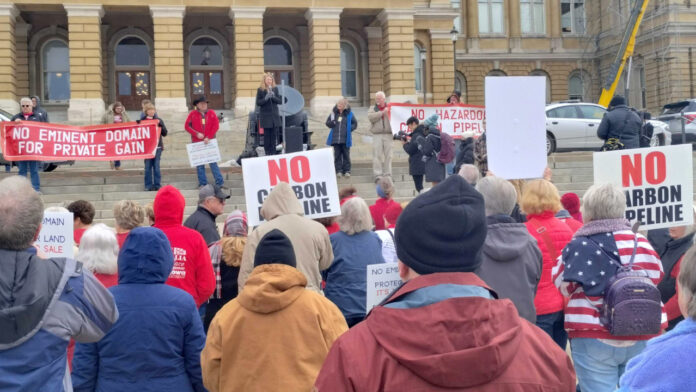
New legislation that was introduced in the Iowa House on Monday to limit eminent domain for carbon dioxide pipelines got preliminary approval Tuesday from a subcommittee.
“Private property rights have to mean something,” said Rep. Steven Holt, R-Denison, who is a co-sponsor of the bill and led the House Judiciary subcommittee hearing Tuesday morning.
House File 368 has emerged as the leading bill of more than 10 proposed this legislative session that have restrictions or new requirements for carbon dioxide pipeline projects. They are in response to proposals by three companies that would construct a total of more than 1,500 miles of pipe in Iowa to transport captured carbon dioxide away from ethanol plants.
‘Drafting error’ would have exempted projects from carbon dioxide pipeline restrictions
Five Iowa Senate bills that were introduced a month ago by Sen. Jeff Taylor, R-Sioux Center, have not had a subcommittee hearing. One of Taylor’s bills would ban entirely the use of eminent domain to get land easements for the pipelines.
“My bills — I’m gonna be honest — they’re stalled right now. … The prospects are slim,” Taylor told a group that gathered Tuesday at the Capitol to oppose the pipelines.
Holt’s bill — which is co-sponsored by House Speaker Pat Grassley, R-New Hartford, and 20 others — got relatively quick attention. It’s unclear when it might be considered by the full House Judiciary Committee.
The bill would put new restrictions on the issuance of the pipeline permits and eminent domain and would expand a landowner’s ability to get compensation for damage from a pipeline’s construction.
The bill would require companies to get voluntary easements from landowners for at least 90% of their routes before being able to use eminent domain to force easements for the rest. The influential Iowa Farm Bureau Federation supports that threshold, along with provisions of the bill that would enable farmers to be paid damages for lost crop yields that persist after construction.
The Farm Bureau’s support of the bill is “all about protecting property rights,” said Kevin Kuhle, who represents the group. “And we believe that infrastructure projects and property rights can coexist.”
The bill also would delay the issuance of permits for carbon dioxide pipelines until new federal safety standards are finalized, which is expected to happen next year.
The bill would require the companies to follow local zoning ordinances and would further limit eminent domain by requiring pipeline companies to first acquire all necessary permits from other states, if their projects extend outside of Iowa.
Opposed by pipeline companies, ethanol industry
All three companies that have proposed the pipelines — Navigator CO2 Ventures, Summit Carbon Solutions and Wolf Carbon Solutions — oppose the legislation. Summit is the furthest along in the permit process and said it has voluntary easement agreements for about two-thirds of its route in Iowa.
The companies have collectively spent hundreds of millions of dollars in pursuit of the projects over the past two years, and they argue it isn’t proper to change the rules that govern the permitting process now.
An early draft of the bill prevented many of its provisions from affecting companies that apply for permits before the bill becomes law, but the version of the bill that was filed Monday retroactively includes the companies that have applied, namely Summit and Navigator.
The Iowa Renewable Fuels Association, which lobbies for policies that benefit ethanol production, has said the pipelines are of huge importance. They would enable ethanol plants to reap federal tax incentives that could more than triple their profit margins, according to a recent study the association commissioned. But the association has warned that without access to carbon capture and sequestration, Iowa’s ethanol producers would be at a competitive disadvantage to producers in other states that could diminish Iowa production by 75%.
Pipeline opponents have rejected the notion that the projects are a life-or-death scenario for ethanol plants. Rep. Helena Hayes, R-New Sharon, told the anti-pipeline crowd Tuesday that other options for carbon capture should be explored. There are at least four Iowa ethanol producers that capture their carbon dioxide to some degree and sell it for commercial purposes, such as to create dry ice.
“Ethanol can still survive in Iowa without the pipeline,” she said.
Another bill targets land surveys
A separate House bill pertaining to the pipelines was also approved by a subcommittee Tuesday and seeks to require explicit permission from landowners to conduct surveys of their properties. Rep. Bobby Kaufmann, R-Wilton, recommended it for passage and amendment with “mini clarifications.” In its original form, the bill would affect land surveys for a variety of work that extends beyond carbon dioxide pipelines.
The surveys have been an early point of contention between anti-pipeline landowners and the pipeline companies. State law allows the surveys after the companies hold informational meetings about their projects and provide 10 days’ notice of the surveys, but that law is the subject of multiple lawsuits and one criminal trespassing case that are set for trials starting next month.
Rep. Zach Dieken, R-Granville, proposed the House survey bill and told the anti-pipeline crowd on Tuesday that he is frustrated — as a law enforcement officer — that he hasn’t been able to assist residents in defending what he considers to be their constitutional property rights.
“(The bill) strips the trespass exemption from the surveyor, so if you guys don’t want them on your land and law enforcement shows up and they won’t leave, guess what, they get treated like everybody else,” Dieken said.
This article was originally published by the Iowa Capital Dispatch and republished here with permission.




